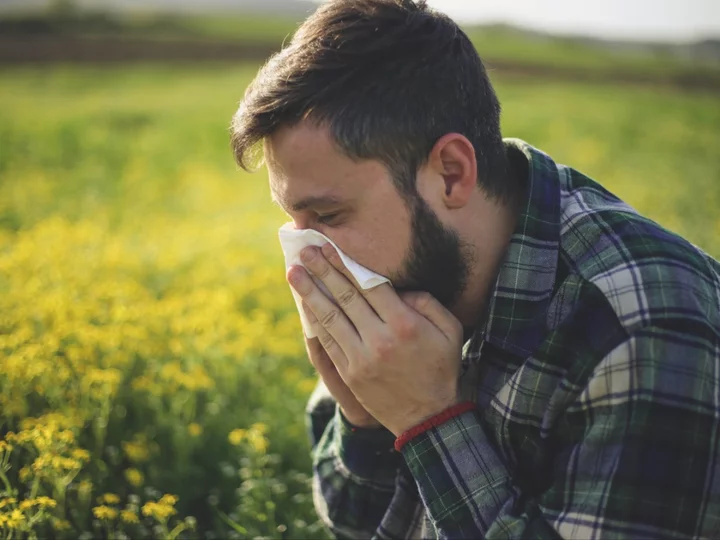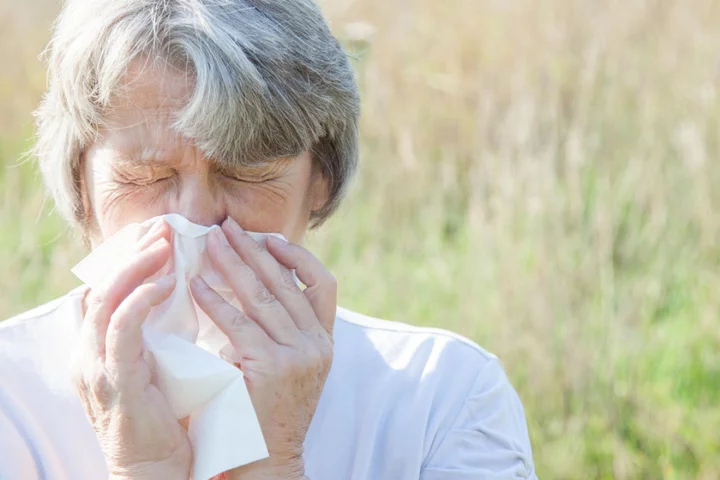
Justice Department wins lawsuit to end JetBlue and American Airlines alliance
American Airlines and JetBlue Airways have to break up their alliance on Northeast US flight routes, a US District Court judge ordered Friday.
2023-05-20 05:22

Mother speaks out after video about putting fake tan on baby goes viral
A mother has clarified that a video she made about giving her child a fake tan was a joke, after she faced a backlash over her footage. Kylen Suttner frequently posts videos on TikTok about her partner and their four-month-old child. In one clip, posted in March, she could be seen holding up her baby, while she appeared to have a serious look on her face. She also poked fun at the self-tanning product that she joked she used on her child, in the text over the video. “When everyone is telling me to stop self-tanning my baby but the loving tan employees have families to feed,” she wrote, referring to the popular self-tanning spray, Loving Tan. In the caption, Suttner added: “loving tan is our fave.” As the video quickly went viral, with more than 1m views, it sparked mixed responses. However, Suttner has now clarified that her video was actually a joke. During an interview with New York Post, she said that her baby had jaundice when he was born, which is what made his skin tan. According to the Cleveland Clinic, jaundice “a condition in which the skin, sclera (whites of the eyes) and mucous membranes turn yellow”. “Everyone commented on his colour, so I decided to make a joke about it. I would never actually use self tanner on my baby,” she said. “I feel like most people understood it was a joke. But the few who didn’t were appalled that I would self tan my baby.” Although Suttner made this clarification about her video, the clip was still hit with criticism regarding the use of using self-tanners on babies. “Disgusting! So horrible!” one wrote, while another added; “I can’t tell if this is a joke?” @kylensuttner loving tan is our fav #tan #selftan #selftanning #selftanday #lovingtan #babyboy #newborn #newbornnap #momtime #naptime #newbornbaby #newbornbabyboy #momtok #postpartumbody #postpartumrecovery #postpartum #fourthtrimester #4thtrimester #newmom #newmomtok #postpartumjourney #csectiondelivery #csection #csectionmom #csectionrecovery ♬ original sound - Barney However, many TikTok users poked fun at the video and realised that it was just a joke. “You gotta keep the tan up, it’s a lifestyle Brian,” one quipped in the comments of the video, while another added: “So funny to me that people think you’re being [for real].” A third wrote: “I love this… I wish I had his skin colour.” The Independent has contacted Suttner for comment. According to the National Health Service (NHS), it is generally safe for women to use fake tan creams and lotions while pregnant. But, the site recommends avoiding spray tans, since “the effects of inhaling the spray are not known”. “The active ingredient in fake tan is dihydroxyacetone (DHA),” the medical site notes. “As the DHA isn’t thought to go beyond the outer layer of skin, it isn’t absorbed into the body and can’t harm your baby [during pregnancy].” The medical site also advises against using tanning pills, which are banned in the UK. “They contain large quantities of beta-carotene or canthaxanthin, which are commonly used as food colourings and can be toxic to an unborn baby,” NHS states. Read More Grandmother praised for refusing to babysit daughter’s newborn unless she’s paid $20 an hour Mother shares horrifying moment she found ticks living in her daughter’s ear Stay-at-home mother explains why she relies on full-time nanny Schoolboy almost dies from swallowing magnets for TikTok challenge Woman shares honest review of New York City apartment TikTok mom slammed after making 5-year-old son run in 104 degree heat
2023-05-20 05:21

American-JetBlue Alliance Blocked by Judge as Anti-Competitive
American Airlines Group Inc. and JetBlue Airways Corp. must dissolve a partnership covering flights across the northeastern US
2023-05-20 04:15

The Best Pet Workplaces Offer Bereavement and Pawternity Leave
Therapy puppies awaited petting in the lobby. A gospel choir sang from a second-story railing. Rocket Larry, a
2023-05-20 03:23

NYC to Allow Outdoor Dining Only Part of the Year, Fewer Hours
The dining sheds that proliferated the streets of New York City during the pandemic will be allowed to
2023-05-20 02:47

Mother clarifies video about using fake tan on baby was a ‘joke’ after backlash
A mother has clarified that a video she made about giving her child a fake tan was a joke, after she faced a backlash over her footage. Kylen Suttner frequently posts videos on TikTok about her partner and their four-month-old child. In one clip, posted in March, she could be seen holding up her baby, while she appeared to have a serious look on her face. She also poked fun at the self-tanning product that she joked she used on her child, in the text over the video. “When everyone is telling me to stop self-tanning my baby but the loving tan employees have families to feed,” she wrote, referring to the popular self-tanning spray, Loving Tan. In the caption, Suttner added: “loving tan is our fave.” As the video quickly went viral, with more than 1m views, it sparked mixed responses. However, Suttner has now clarified that her video was actually a joke. During an interview with New York Post, she said that her baby’s tan skin is due to his jaundice, “a condition in which the skin, sclera (whites of the eyes) and mucous membranes turn yellow,” according to the Cleveland Clinic. “Everyone commented on his colour, so I decided to make a joke about it. I would never actually use self tanner on my baby,” she said. “I feel like most people understood it was a joke. But the few who didn’t were appalled that I would self tan my baby.” Although Suttner made this clarification about her video, the clip was still hit with criticism regarding the use of using self-tanners on babies. “Disgusting! So horrible!” one wrote, while another added; “I can’t tell if this is a joke?” @kylensuttner loving tan is our fav #tan #selftan #selftanning #selftanday #lovingtan #babyboy #newborn #newbornnap #momtime #naptime #newbornbaby #newbornbabyboy #momtok #postpartumbody #postpartumrecovery #postpartum #fourthtrimester #4thtrimester #newmom #newmomtok #postpartumjourney #csectiondelivery #csection #csectionmom #csectionrecovery ♬ original sound - Barney However, many TikTok users poked fun at the video and realised that it was just a joke. “You gotta keep the tan up, it’s a lifestyle Brian,” one quipped in the comments of the video, while another added: “So funny to me that people think you’re being [for real].” A third wrote: “I love this… I wish I had his skin colour.” The Independent has contacted Suttner for comment. According to the National Health Service (NHS), it is generally safe for women to use fake tan creams and lotions while pregnant. But, the site recommends avoiding spray tans, since “the effects of inhaling the spray are not known”. “The active ingredient in fake tan is dihydroxyacetone (DHA),” the medical site notes. “As the DHA isn’t thought to go beyond the outer layer of skin, it isn’t absorbed into the body and can’t harm your baby [during pregnancy].” The medical site also advises against using tanning pills, which are banned in the UK. “They contain large quantities of beta-carotene or canthaxanthin, which are commonly used as food colourings and can be toxic to an unborn baby,” NHS states. Read More Grandmother praised for refusing to babysit daughter’s newborn unless she’s paid $20 an hour Mother shares horrifying moment she found ticks living in her daughter’s ear Stay-at-home mother explains why she relies on full-time nanny Schoolboy almost dies from swallowing magnets for TikTok challenge Woman shares honest review of New York City apartment TikTok mom slammed after making 5-year-old son run in 104 degree heat
2023-05-20 01:58

Why do we get hay fever and what are the symptoms?
A runny nose, watery eyes, sneezing, coughing – whatever your hay fever symptoms, it’s no surprise if you’ve had a flare-up recently. During spring, both tree and grass pollen is released into the air. If you’re allergic to the proteins they contain, your nose, eyes, throat and sinuses can become swollen, irritated and inflamed. “Many people are suffering from hay fever just now because the pollen count is high, thanks in part to climate change,” says Dr Nisa Aslam, GP from Typharm’s Skin Life Sciences Foundation. “Plus the pollen season is getting longer.” The immune function plays an important role in an allergic reactions, she explains. “People who suffer from hay fever often have a family history of not just hay fever, but also skin conditions such as eczema or psoriasis, which can often be borne out of problems with the immune system.” The weather can also be a contributing factor in how badly you’re affected. “Some hay fever sufferers may be experiencing a sudden spike in their symptoms a bit earlier than usual, this may be due to the recent prolonged wet and windy weather,” says Claire Nevinson, superintendent pharmacist at Boots. “On a daily basis, rainfall tends to decrease pollen, but over a period of months, intermittent wet days tend to produce a more severe hay fever season overall.” Conditions could be about to get even worse. A recent study by the University of Worcester, published in the Science of The Total Environment journal, warned that it could be one of the worst seasons for birch pollen on record. The severity is due to two things. “Firstly, higher than average temperatures last June, when the pollen is produced, allowed greater potential for high pollen levels,” says Dr Beverley Adams-Groom, senior pollen forecaster at the university. “Secondly, birch trees have a biennial pattern of pollen production, one mild year and one severe year, and this year was already expected to be a high year.” So what can you do if your hay fever is much worse than usual at the moment? The first step is to avoid exposure to the pollen that affects you the most. “Allergens responsible for hay fever include grass pollens and tree pollens [spring and summer], weed pollens and fungal mould spores,” says Dr Aslam. “Watch the daily pollen forecasts. Don’t go outside when the pollen count is high and keep all windows shut.” Preventive medicines can help to reduce symptoms if you know in advance when you’re going to be exposed to pollen. “This can be a steroid nasal spray one to two weeks before symptoms start,” says Dr Aslam. Alternatively, natural nasal sprays “can help to prevent the symptoms of hayfever and other types of allergic rhinitis by forming a protective film in our inner nose, stopping allergens that we breathe in from trying to enter our respiratory system”, she says. Similarly, ointments like Vaseline can act as a pollen trap. “Apply a barrier balm of petroleum jelly around your nose to trap the pollen and help relieve dry and uncomfortable skin from repetitive nose blowing,” Ms Nevinson says. “Shower and change your clothes after you have been outside to wash pollen off and wear wraparound sunglasses to stop pollen getting into your eyes.” Read More Seasonal allergies tips and tricks as pollen count rises What is the link between pollen and eye infections? Hay fever may be mistaken for Covid, warns expert Why do heatwaves in the UK feel hotter than abroad? The startling and grim discoveries unearthed by the climate crisis Earth’s CO2 hits highest recorded level in human history
2023-05-20 01:49

Why is my hay fever so bad at the moment?
A runny nose, watery eyes, sneezing, coughing – whatever your hay fever symptoms, it’s no surprise if you’ve had a flare-up recently. During spring, both tree and grass pollen is released into the air. If you’re allergic to the proteins they contain, your nose, eyes, throat and sinuses can become swollen, irritated and inflamed. “Many people are suffering from hay fever just now because the pollen count is high, thanks in part to climate change,” says Dr Nisa Aslam, GP from Typharm’s Skin Life Sciences Foundation. “Plus the pollen season is getting longer.” The immune function plays an important role in an allergic reactions, she explains. “People who suffer from hay fever often have a family history of not just hay fever, but also skin conditions such as eczema or psoriasis, which can often be borne out of problems with the immune system.” The weather can also be a contributing factor in how badly you’re affected. “Some hay fever sufferers may be experiencing a sudden spike in their symptoms a bit earlier than usual, this may be due to the recent prolonged wet and windy weather,” says Claire Nevinson, superintendent pharmacist at Boots. “On a daily basis, rainfall tends to decrease pollen, but over a period of months, intermittent wet days tend to produce a more severe hay fever season overall.” Conditions could be about to get even worse. A recent study by the University of Worcester, published in the Science of The Total Environment journal, warned that it could be one of the worst seasons for birch pollen on record. The severity is due to two things. “Firstly, higher than average temperatures last June, when the pollen is produced, allowed greater potential for high pollen levels,” says Dr Beverley Adams-Groom, senior pollen forecaster at the university. “Secondly, birch trees have a biennial pattern of pollen production, one mild year and one severe year, and this year was already expected to be a high year.” So what can you do if your hay fever is much worse than usual at the moment? The first step is to avoid exposure to the pollen that affects you the most. “Allergens responsible for hay fever include grass pollens and tree pollens [spring and summer], weed pollens and fungal mould spores,” says Dr Aslam. “Watch the daily pollen forecasts. Don’t go outside when the pollen count is high and keep all windows shut.” Preventive medicines can help to reduce symptoms if you know in advance when you’re going to be exposed to pollen. “This can be a steroid nasal spray one to two weeks before symptoms start,” says Dr Aslam. Alternatively, natural nasal sprays “can help to prevent the symptoms of hayfever and other types of allergic rhinitis by forming a protective film in our inner nose, stopping allergens that we breathe in from trying to enter our respiratory system”, she says. Similarly, ointments like Vaseline can act as a pollen trap. “Apply a barrier balm of petroleum jelly around your nose to trap the pollen and help relieve dry and uncomfortable skin from repetitive nose blowing,” Ms Nevinson says. “Shower and change your clothes after you have been outside to wash pollen off and wear wraparound sunglasses to stop pollen getting into your eyes.” Read More Seasonal allergies tips and tricks as pollen count rises What is the link between pollen and eye infections? Hay fever may be mistaken for Covid, warns expert Why do heatwaves in the UK feel hotter than abroad? The startling and grim discoveries unearthed by the climate crisis Earth’s CO2 hits highest recorded level in human history
2023-05-20 00:16

What to Stream This Weekend
The content pile is vast, and you've got the whole weekend to decide how you
2023-05-19 23:15

Luxury Resort on Dubai’s Palm Islands Close to Selling For $280 Million
Anantara The Palm Dubai, a luxurious resort on one of the city’s famous artificial tree-shaped islands, is close
2023-05-19 21:58

IFF Weighs Sale of $1 Billion Lucas Meyer Cosmetics Unit
International Flavors & Fragrances Inc. is weighing a sale of a unit making ingredients for the cosmetics and
2023-05-19 21:29

10 things you should know about living with a stoma
Musician Tom Speight was diagnosed with the long-term bowel condition Crohn’s disease 15 years ago. After undergoing emergency surgery for the condition , he had a stoma connected to his digestive system. As today marks World Inflammatory Bowel Diseases Day (IDB), Speight has opened up about the realities of living with a stoma and debunks 10 common misconceptions about his condition. A stoma is an opening on the abdomen that can be connected to either your digestive or urinary system to allow waste to be diverted out of your body. Stomas are sometimes used after surgery to remove cancers in your pelvic area or help treat inflammatory bowel diseases, such as Crohn’s disease or ulcerative colitis. How does Crohn’s impact on your life and mental health? Over the years, [there have been some] really difficult situations to deal with – I was hospitalised last year while I was making my album, and lying in hospital, not knowing if I was going to be well enough to finish what I’d been working so long and so hard for was really really demoralising. For me, stress is a big trigger, so when you’re stressing about keeping up with everything and keeping on top of things it was actually making me worse. There’s a ripple effect to this disease in that your limitations can affect how others [family and friends] live their life,” he said. “I’ve been having regular therapy since 2019 to help manage my stress and improve my mental health. Working out how to manage the condition is unbelievably frustrating. Finding the right team of doctors, the right medication, and the right diet is such a draining process. For me, one of the hardest parts is knowing that despite everything you try, the trial and error process you go through can ultimately put you back in hospital if it’s not quite right. It can be a scary thought. The prospect of having a third operation or a sixth stay in hospital is always there, at the back of my mind. Here are the 10 most common misconceptions about living with a stoma, according to Speight: 1. Swimming is fine Often people believe that having a stoma means you can’t enjoy the same hobbies and activities that you did before you had the operation. Swimming comes to mind first: I think people presume you’ll have a leakage or accident, but in the 10 years I’ve had the stoma. I’ve never once had a problem. The stoma bag is waterproof and secure due to its adhesive. There’s no reason why a person with a stoma can’t swim with confidence. 2. What you can and cannot eat When I first spoke to my stoma nurse, I asked about my dietary requirements and what to avoid... you’d be surprised about what’s on the forbidden list. Some people may be advised to avoid eating very fibrous foods, or foods with tough outer skins such as sweetcorn, popcorn, peas and potato skins, to avoid causing a blockage in the bowel. Often eating out can feel like a game of Russian roulette. I’ve had many episodes where I’ve been caught out and been absolutely floored in the process. 3. Being visible I was 24 when I first had the emergency surgery to have a stoma. At the time, I thought having the operation would mean my career was over... you can’t be a pop star and have a bag, right? In reality, no one actually will know until you tell them. I’ve worn tight-fitting clothes while channelling my best Freddie Mercury moves and it’s never been a problem. I kind of wish I could tell my younger self that things will be ok and it’s not the end. In some ways, it was just the start, because it gave me a whole new lease of life. 4. ‘Only elderly people have stomas’ I originally thought only old people have stomas, and yes, the elderly are more likely to have a stoma, but surgery can be performed on anybody at any age. I’ve met a number of younger people through the charity Crohn’s & Colitis UK who are just like me, and it’s quite comforting to know you’re not alone. 5. Sex Without being too graphic, this isn’t a problem. It’s all about finding the right partner who can make you feel safe and confident. 6. Smell A lot of the misconceptions about having a stoma were things I initially thought too. I thought it would be unhygienic and, quite frankly, not smell so fresh. The reality is, you’ll only ever notice the smell when you go change it in the toilet. In some ways, it would be no different from anyone else using the loo 7. Is this permanent? For some patients, a stoma is permanent. However, for many, an ostomy is performed to allow for the bowel to heal from scarring, inflammation and infection. I personally need to get to a level of health where a reversal could be performed, while also managing to take some time off to heal properly. 8. ‘You can’t exercise’ I think this misconception might be because people might think you’re vulnerable or weak due to the operation. Exercising regularly can have a really positive impact on people with a stoma, as it reduces the risk of a hernia and keeps your body fit. I’ve never felt stronger in my life. 9. Find the nearest toilet I think people often think you’re walking around with poop all day... this isn’t the case! You just have to go to the toilet like everyone else. 10. The reality is... Yes, it’s a life changing operation but with a few mindful changes you can lead a happy and healthy life. Just avoid the popcorn and drink plenty of water. Read More Ninety-five per cent of Black adults don’t swim – meet the people trying to change that How being seduced by gambling’s love bombing ended with a prison sentence ‘Unproblematic people don’t age’ reflects the stupidest kind of beauty standard Woman, 50, to become a surrogate mother for same-sex couple Doctors dismissed her as a hypochondriac. Then came an incurable diagnosis Festival founder hopes to help tackle women’s health taboos
2023-05-19 20:25
